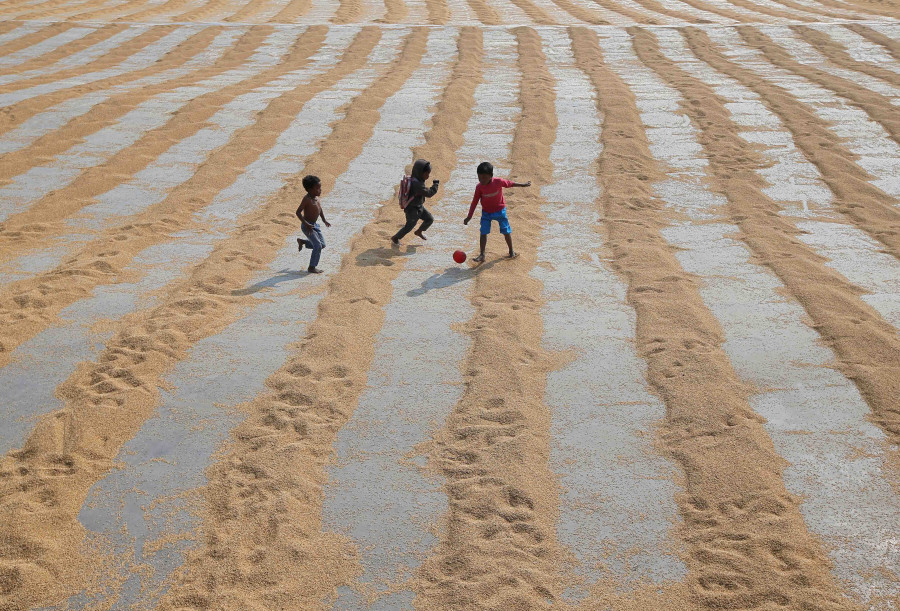Money
Nepal passed over for rice export quotas
Officials say India has not responded to Nepal's request for export quotas of paddy, rice and sugar.
Krishana Prasain
Nepal's request to India for rice export quotas remains unaddressed while it has allocated export quotas of non-basmati rice to Bhutan, Mauritius and Singapore.
On Wednesday, India issued a notification through the Directorate General of Foreign Trade permitting the export of 79,000 tonnes to Bhutan, 14,000 tonnes to Mauritius and 50,000 tonnes to Singapore.
India imposed a ban on the export of non-basmati rice on July 20 considering its own needs. And in the first week of August, Nepal’s Ministry of Industry, Commerce and Supplies asked the Indian government for export quotas of 1 million tonnes of paddy, 100,000 tonnes of rice and 50,000 tonnes of sugar.
“We have not received any response from India to our request,” said Gobinda Bahadur Karki, joint secretary at the Ministry of Industry, Commerce and Supplies.
“We made a timely request with the southern neighbour for the food items to prevent shortages,” he said. “Our timely response after India’s ban was to negotiate for the quota.”
Last July, Nepal’s southern neighbour ordered a halt to rice exports triggering fears of further inflation in global food markets.
India, the world's largest exporter of rice, said it was imposing a ban on the export of non-Basmati white rice to keep its food reserve intact amid the threat of El Niño disruptions.
India accounts for more than 40 percent of the world’s rice exports, and low inventories with other exporters means any cut in shipments could inflate food prices already driven up by Russia's invasion of Ukraine last year and erratic weather.
Nepali government officials say that except for price hikes in a few items, the supply of rice in the market is normal.
But traders warn that since the new harvest will arrive only in November, the export ban by India may trigger a shortage of rice and other food items in Nepal.
Officials at the Industry Ministry say that Indian rice has been entering Nepal in spite of the ban because of the leaky border between the two countries. They said there was no need for concern.
According to Kisan Tak, an Indian daily in Uttar Pradesh, 50 tonnes of rice is being smuggled into Nepal from India daily. The rice smugglers are making huge profits from mota rice which is being sold at IRs35 per kg in the Nepali market.
They are selling mahin basmati rice at IRs50 per kg in Nepal. The prices of mota and mahin basmati rice are IRs25 per kg and IRs35 respectively in India.
Rice is being smuggled from Lakhimpur, Khiri, Baharaich and Siddharth Nagar of Uttar Pradesh, the news portal said. Rice reaches villages in Indian border districts in the day time where it is packed in small sacks and bags. Women and children carry the bags to the border districts of Nepal, it said.
Within a week of the rice ban by India, prices in Nepal of all types of rice increased by Rs200 to Rs250 per 20-kg or 25-kg bag. Despite having an adequate inventory, traders increased prices on the pretext of the embargo, analysts said.
On August 25, a month after the export ban on non-basmati rice, India imposed a 20 percent export duty on parboiled rice. The move is expected to further reduce shipments by India, and lift global rice prices which are already close to 12-year highs.
In September 2022, India banned exports of broken rice and imposed a 20 percent duty on exports of various grades of rice as it sought to boost domestic supplies and calm local prices after a below-average monsoon rainfall curtailed planting.
The repercussions of the ban were felt immediately in Nepal as the retail prices of imported rice increased by Rs150 to Rs200 per 20-kg bag.
Nepal requires 4 million tonnes of rice annually to feed its population, and the deficit is made up by imports from India.
According to the Department of Customs, Nepal imported 233,975 tonnes of rice worth Rs15.91 billion from India in the last fiscal year ended mid-July. The country had imported 578,760 tonnes of rice worth Rs30.58 billion in the previous fiscal year 2021-22.
Nepal imported 555,869 tonnes of paddy worth Rs19.99 billion in the last fiscal year. The country imported 546,633 tonnes of paddy worth Rs16.12 billion in the previous fiscal year.
According to international media, India is expected to ban the export of sugar in the next season beginning in October, halting shipments for the first time in seven years due to lack of rain cutting the sugarcane yields.
Nepal imported 28,305 tonnes of sugar valued at Rs1.77 billion from India in the fiscal year. The country had imported 93,571 tonnes of sugar worth Rs4.90 billion in the previous fiscal year.
India imposed a ban on wheat exports on May 13 last year after unseasonably hot weather affected the wheat crop sending local prices soaring.
In April, Nepal requested the Indian government to provide wheat and India permitted the export of around 1.05 million tonnes of food grains to Nepal, Indonesia, Senegal and Gambia as part of its economic diplomacy, waiving curbs on exports.
On August 19, India imposed a 40 percent export duty on onions to improve its domestic availability and control prices.
India has imposed a series of measures to tighten food exports which has pushed up food prices in Nepal. Coming just ahead of the autumn festival season, it is a big blow to Nepali consumers.




 8.54°C Kathmandu
8.54°C Kathmandu














